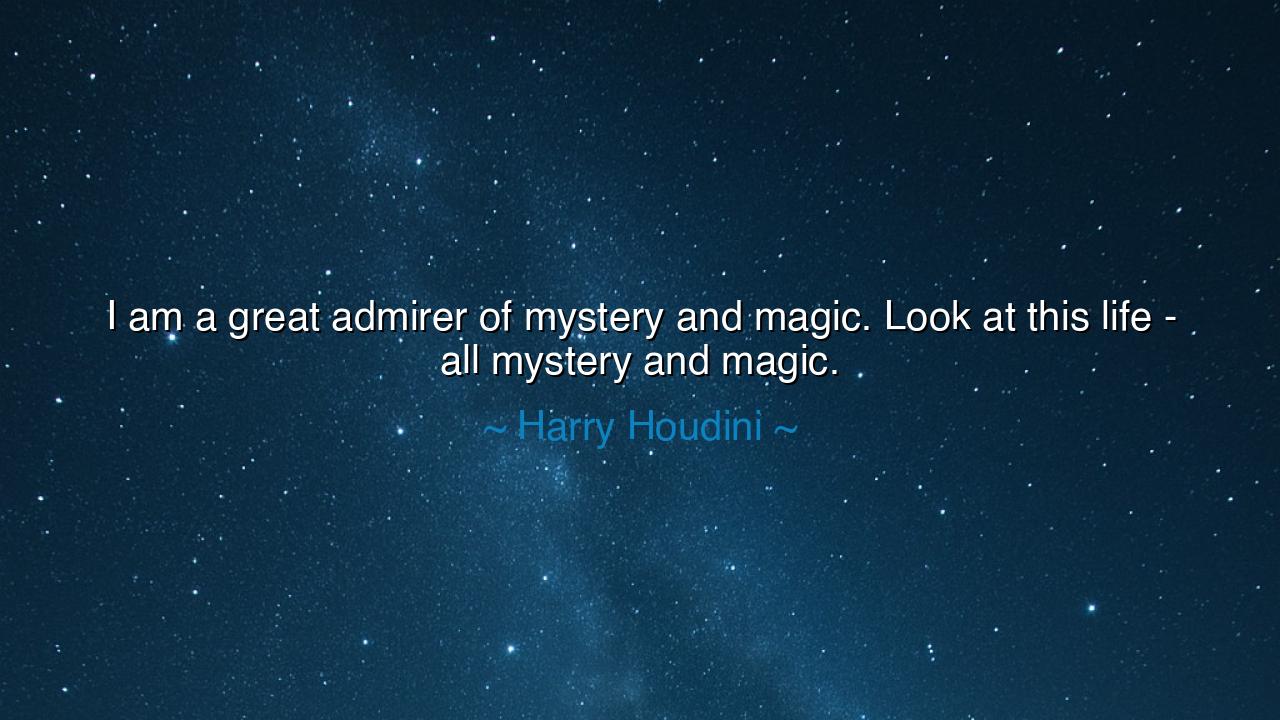
I am a great admirer of mystery and magic. Look at this life -






In the voice of wonder and revelation, Harry Houdini once declared: “I am a great admirer of mystery and magic. Look at this life — all mystery and magic.” These words, spoken by one of history’s most celebrated illusionists, transcend the world of performance. They are not merely the musings of a magician, but the creed of a philosopher—one who looked at existence itself and saw not confusion, but enchantment. For within this quote lies the ancient truth that life, in all its vastness and uncertainty, is a grand and sacred illusion, filled with depths that no human eye can fully perceive.
To the ancients, mystery was not a problem to be solved but a divine force to be revered. They believed that what could not be understood was not meant to frustrate, but to awaken awe. The stars were mysterious, yet they guided sailors home. The birth of a child, the fall of rain, the stillness of death—all were veiled in shadow, yet filled with meaning. Houdini, the master of illusions, spent his life creating wonders that defied logic, yet even he, who could slip chains and escape death’s grasp, knew that the greatest illusion was not on the stage, but in life itself. To admire mystery and magic is, therefore, to honor the unseen hand that moves all things—the spirit that animates both art and being.
Houdini’s life was itself a testament to this belief. Born Erik Weisz, a poor Jewish immigrant in the late 19th century, he rose through relentless will to become a symbol of freedom and transformation. Bound by ropes, sealed in water-filled tanks, or locked in iron, he broke his bonds again and again—not merely as spectacle, but as metaphor. Each escape whispered to his audience: “You, too, can transcend your limits.” And yet, beneath the bravado, Houdini was a man who marveled at existence. He admired the mystery of the mind, the magic of endurance, the wonder that allows human beings to dream, to create, and to believe. In his art, he revealed a truth older than time: that what appears impossible is often only unseen potential waiting to be realized.
The ancients would have seen in Houdini a priest of wonder, not unlike the philosophers of Greece or the mystics of the East. For to them, the world itself was a temple of hidden meaning. The philosopher Heraclitus once said, “Nature loves to hide.” He understood, as Houdini did, that behind every ordinary thing lies the extraordinary. The rising sun, the blooming flower, the laughter of a child—each is a miracle disguised as routine. Those who lose sight of mystery grow weary of living; those who cherish it walk through life as if through a dream—awake, yet astonished.
When Houdini says, “Look at this life—all mystery and magic,” he calls us to awaken our perception. For life, like a master illusion, reveals only what we are ready to see. To the cynical, existence is dull and mechanical. But to the open-hearted, even the smallest act—a breath, a heartbeat, a sunrise—is filled with infinite complexity and grace. Magic is not the trick performed before your eyes; it is the recognition that your very eyes, your very mind, are miracles themselves.
History gives us many who lived by this truth. Albert Einstein, though a man of science, once said, “The most beautiful thing we can experience is the mysterious.” He understood that discovery is not the destruction of wonder, but its deepening. Every new law of physics, every revelation of the cosmos, only magnifies the sense of awe. Like Houdini, Einstein knew that to admire mystery is not to surrender reason—it is to remember that reason itself is born from wonder.
Thus, the teaching of Houdini’s words is clear: do not outgrow amazement. The modern world, with its machinery and precision, tempts us to believe that everything can be explained, predicted, and controlled. But when we lose our reverence for the unknown, we also lose our joy. To live fully is to let mystery breathe within you—to see the divine artistry in both the chaos and the order of existence.
So let this be the lesson passed to those who seek meaning: live as an admirer of mystery and magic. Look at the stars and feel their pull upon your soul. Listen to the silence between heartbeats. Marvel at the resilience of love, the courage of the human spirit, the grace that turns suffering into wisdom. For when you look upon life through the eyes of wonder, you will see what Houdini saw—that beyond the veil of reason lies the eternal enchantment of being alive, and that this life, in all its fleeting beauty, is itself the greatest magic of all.






AAdministratorAdministrator
Welcome, honored guests. Please leave a comment, we will respond soon